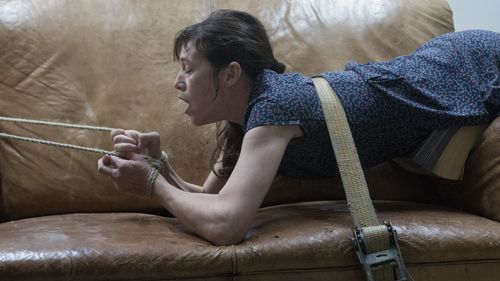
Christian Geisnaes/Magnolia Pictures
MOVIE REVIEW
Nymphomaniac (2014)
Upholding the tradition by which Lars von Trier spooks the massed ranks of the tabloids with talk of pornography before then unveiling films that prove as arousing as a kick in the knee, the four-hour, two-volume “Nymphomaniac” is merciless and hilarious in close proximity. The story skips between an intellectual investigation of a woman’s insatiable libido and a stylized erotic farce, threatening to cast its vote against optimism altogether and decide that no peace between the sexes is possible or perhaps advisable. Along the way, Volume I — with its droll laughs at regular intervals — becomes Volume II, which plunges into darkness headfirst. Large themes are invoked; large genitalia are inspected. Large theories are inevitable.
The spine of the film is a large conversation, between convalescing sex addict Joe (Charlotte Gainsbourg) and Seligman (Stellan Skarsgård), the older Good Samaritan who finds her beaten up in an alley and interprets her behavior in terms of philosophy, numerology and religion. Unreliable narration is a factor from the off, as Volume I sees Joe giving Seligman a detailed rundown of her sexually adventurous youth (played by Stacy Martin in flashbacks), along with stories of her loving father (Christian Slater), her distant mother (Connie Nielsen), and an on-off relationship with bad boy Jerôme (Shia LaBeouf, deploying the oddest English accent since Keanu Reeves, circumflex accent or no.) Volume II revolves around more recent events, with adult Joe becoming a parent and drifting into criminality before winding up in that alley. She also becomes mentor to a young girl known as P (Mia Goth), a deeply discomfiting relationship for the audience if no one else.
The film’s agitation of the British media seems particularly apt, since the oddball English Neverland conjured up by the accents, vehicles and general ribaldry can’t help but suggest that the culture most terrified by Joe’s forceful claiming of her own pleasure centers is the Anglo-Saxon one. The embrace of sexual power as an alternative to a bland existence is rightly set up as empowerment, although a feminist reading would then also have to accommodate Mr. von Trier’s general view of inevitable human unhappiness, which settles over Joe like a descending fog and might also spread over the audience. The film breaks down into enough sharp fragments to build a multitude of theories, while proving none of them. It also pointedly ignores Joe’s mother, which relegates Ms. Nielsen to scant few seconds of screen time and raises more thematic questions than it answers.
Mr. von Trier puckishly puts the Shostakovich waltz from “Eyes Wide Shut” onto the soundtrack, a call back to another film in which desire and pleasure stayed resolutely separate. Puckish might also be the best word for the investigation of how best to digitally merge the bottom half of a male porn actor practicing his craft onto the top half of Mr. LaBeouf, or for staging a hair-raising echo of “Antichrist” in a film that’s quite different in intention. But pondering such things only confirms that Mr. von Trier has already pre-empted most paths through the thicket and lies waiting for you around every corner. Brazen and sarcastic, morose and lead-footed, it’s the clearest statement of Mr. von Trier’s belief in life’s many carnal contradictions since the last one, and seems likely to remain so until the next one.
Comments